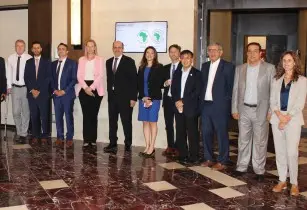The African Development Bank (AfDB) has restated its support for the Libyan Government’s agenda to boost food security and build resilience in the North African country
The Bank hosted the meeting to deepen dialogue with the Libyan Government on key priorities, including agriculture. It formed part of the bank’s engagements in response to global challenges, building on the outcomes of the Dakar 2 Summit on Food Sovereignty and Resilience in Africa which took place in January this year. AfDB has rolled out a US$1.5bn African emergency food production facility to boost food security and nutrition. Launched in May last year, the facility is helping Africa mitigate rising food prices and inflation, worsened by climate change, the Covid-19 pandemic, and Russia’s war in Ukraine.
The meeting discussed the complex challenges facing the formulation and implementation of food security strategies, such as climate change, water management, nutrition, and the need for inclusiveness and preparedness for emergency responses. The Bank shared its experience of supporting other northern regional countries like Egypt and Tunisia in preparing their compact on the wheat value chain. The international agencies also shared their experience and approach to food security.
The Libyan delegation headed by Mahmoud El Futaisi, director general of the National Economic and Social Development Board commended the Bank’s initiatives to ensure food security across Africa amid global challenges. “Providing food for Libyans through preparing a food security strategy is paramount to the government,“ he said, adding that despite the challenges, setting clear goals and milestones will ensure efficiency and achieve results.
The meeting also showcased the development partners' resolve to dovetail efforts and strengthen partnerships to ensure Libya’s first national food security strategy succeeds. To achieve this goal, participants agreed to establish a coordination working group and a technical task force to drive the strategy. This will define the way forward with a concrete action plan and measures within a defined timeline.





